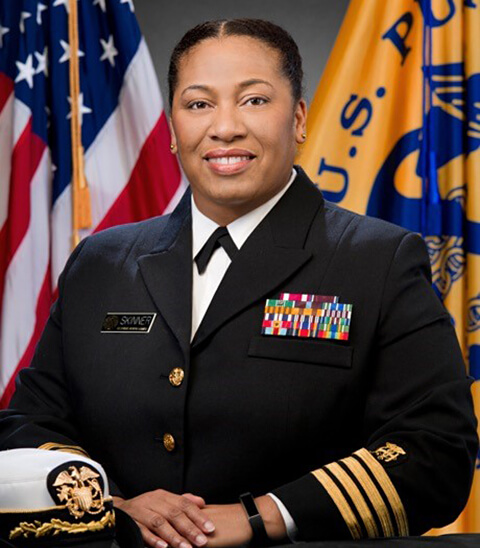CAPT Brianna Skinner, DVM, MPH, Senior Regulatory Veterinarian
“Since FDA influences standards that ensure the safety of the Nation's food, drugs, biologics, and medical devices, I get to see every day how my job affects my life and the lives of my family and friends.”
CAPT Brianna Skinner, DVM, MPH, Senior Regulatory Veterinarian, Office of Counterterrorism and Emerging Threats, Office of the Chief Scientist
Q: What opportunities does FDA offer you that you couldn't get elsewhere?
CAPT Brianna Skinner, DVM: FDA has given me the opportunity to widen my career horizons beyond clinical and public health practice in a laboratory setting. For most of my career as a veterinarian and laboratory animal specialist, I worked very closely with principal investigators on studies exploring infectious diseases for the benefit of people and animals. The work was relevant to nonclinical animal studies exploring current public health issues that had to align with animal welfare laws, regulations, and standards. Although these exploratory studies were very important for public health, I seldom saw how my work contributed directly to public health beyond the exploratory phase. Because FDA's regulatory mission influences real-world applications, since joining the agency, I've had the chance to see my work expand beyond exploration. I've been able to use my expertise to represent FDA on a variety of animal welfare and public health issues, including those related to FDA's One Health Initiative.
Q: Why do scientists like you stay at FDA?
BS: First, it's an honor and privilege to work with such a wide variety of intelligent and talented professionals from different disciplines but with mutual public health interests on a range of mission-critical topics. Second, FDA has a significant role in regulating products that affect my health and that of my family, friends, and other loved ones (e.g., my furry friends and family pets). Since FDA influences standards that ensure the safety of the Nation's food, drugs, biologics, and medical devices, I get to see every day how my job affects my life and the lives of my family and friends. In that way my work at FDA is a rewarding and meaningful experience.
Q: How do you use your science degree at FDA?
BS: I'm using my Doctor of Veterinary Medicine (DVM) and Master's in Public Health (MPH) in several ways. One notable example is how I'm applying my degrees to advance a One Health approach in my work. One Health is defined as “…a collaborative, multi-sectoral, and transdisciplinary approach — working at the local, regional, national, and global levels — with the goal of achieving optimal health outcomes, recognizing the interconnection between people, animals, plants, and their shared environment.” With its One Health Initiative, FDA has been working towards integrating this mindset into all of our mission-driven efforts across the agency. In this regard, FDA has given me the chance to use all of my veterinary, public health, and laboratory animal specialty skills to solve human, animal, and environmental health issues. Through my participation in our One Health Initiative, I work with experts from multiple disciplines and sectors who share common interests in a broad range of public health issues.
Q: How is science conducted at FDA different from science performed at the National Institutes of Health, academia, or industry?
BS: Science conducted at FDA supports our mission of determining how products under our legal authority will be regulated. Additionally, the science gives us the information we need to provide guidance to industry so that it can develop innovative products that are safe and effective--both in times of peace and during major public health crises like the COVID-19 pandemic we are now facing. For example, the science we do with our other federal counterparts in FDA's Office of Counterterrorism and Emerging Threats--where I work--addresses public health needs by supporting and facilitating the development of novel medical countermeasures and the approval of diagnostics, medications, and treatments for emergency use authorizations.


